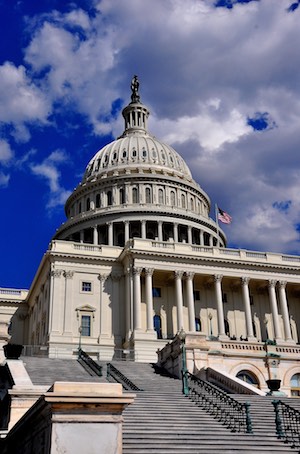 Innovation, just like the businesses that it creates, cannot thrive in an environment of uncertainty. Unfortunately, the Patent Office and Federal courts—the very legal institutions that are supposed to secure stable and effective intellectual property rights for innovators and their creations—have created a precarious situation for software patents leading to a substantial degree of uncertainty for the high-tech industry.
Innovation, just like the businesses that it creates, cannot thrive in an environment of uncertainty. Unfortunately, the Patent Office and Federal courts—the very legal institutions that are supposed to secure stable and effective intellectual property rights for innovators and their creations—have created a precarious situation for software patents leading to a substantial degree of uncertainty for the high-tech industry.
On the anniversary of the Computer Software Copyright Act, we should keep in mind that Congress can and should step in to remove the uncertainty and ensure that software innovation is sufficiently well protected.
As the Federal Circuit continues to sow uncertainty about the eligibility of “software patents,” it is important to remember that the current debate about protecting the innovations of computer and software engineers is not new. We have been here before. Last time, the debate ended when Congress stepped in to expressly acknowledge copyright protection of software code. It is now long past time Congress to do the same with patents for the functional aspects of software.
Adam Mossoff previously detailed why software patents are valid under existing law. To remove any uncertainty over the eligibility of wrongly vilified “software patents,” Congress should expressly validate as patentable the inventions in the useful functions of computer programs.
Part of the problem with the debate over “software patents” has been the near complete failure to accurately describe what these patents protect. Opponents of software patents frequently describe these patents as protecting nothing more than “mathematics” or logic. This is plainly false.
Software is a valuable, real-world, technological innovation that is used in everything from vacuums to cars to computers to phones. Recent high profile software patent disputes involved a patent improving how computer generated faces are animated when speaking and another improving the functionality of spreadsheets in programs like Excel.
Not only do software patents protect important innovations, they are commercially valuable as well. Software patents are often a necessary step for start-ups to obtain venture capital financing. Software, like any other technology, requires investment in research and development. Software patents ensure that software innovators can realize the value of their contributions. By facilitating and protecting investments in developing a product, software patents promote many of the advancements that we take for granted today.
It is therefore important to take the threat to software patents seriously. The current debate over the eligibility of software patents centers on whether a given patent is directed to an “abstract idea.” The Supreme Court has avoided defining what qualifies as an abstract idea, limiting itself to saying that hedging risk or intermediated settlement in financial transactions are abstract ideas.
The lack of guidance has left the Federal Circuit in a state of disarray. Commentators have frequently noted the difficulty demonstrated by courts in assessing software patent eligibility. Contradictory court decisions are a frequent occurrence not just at the Federal Circuit, but in the lower courts as well. The lack of clear legal protection is currently harming software innovation.
The software industry experienced similar problems in the 1970’s. At that time, the policy necessity was to protect software code against illicit copying. Reduced costs in computers and the new availability of magnetic floppy disks had made software copying an industry threatening endeavor.
Contradictory court decisions on whether software code was a language worthy of copyright protection caused uncertainty and harm as companies were beginning to sell computer programs to a broader class of users. Notwithstanding the clear need for protection of software code, a congressionally created commission was divided on whether copyright was an appropriate tool for this purpose. The debate only ended when Congress passed the Computer Software Copyright Act of 1980, clearly articulating the copyrightability of software programs.
Today, it is often trivial for different software engineers to replicate with different code a new functionality once they have observed the functionality in the creator’s program. In order to protect innovations, it is necessary to protect these new and useful functionalities, not just the underlying code.
Copyright does not extend to these functional aspects of computer programs. Patents, on the other hand, are expressly purposed for protecting new and useful inventions. Thus, patent protection should be used to promote the innovations developed by software engineers operating in today’s technological environment.
Despite this need, there are still those, even in the courts, that completely object to the patenting of software. Uncertainty over the eligibility of software patents is harming the industry. Congress has previously demonstrated that it can act to protect software and prevent the harms flowing from uncertainty. Now, Congress must do so again by affirming that software is patent eligible subject matter. The high-tech sector in the innovation industries deserves no less.

![[IPWatchdog Logo]](https://ipwatchdog.com/wp-content/themes/IPWatchdog%20-%202023/assets/images/temp/logo-small@2x.png)

![[Advertisement]](https://ipwatchdog.com/wp-content/uploads/2024/04/UnitedLex-May-2-2024-sidebar-700x500-1.jpg)
![[Advertisement]](https://ipwatchdog.com/wp-content/uploads/2024/04/Artificial-Intelligence-2024-REPLAY-sidebar-700x500-corrected.jpg)
![[Advertisement]](https://ipwatchdog.com/wp-content/uploads/2024/04/Patent-Litigation-Masters-2024-sidebar-700x500-1.jpg)

![[Advertisement]](https://ipwatchdog.com/wp-content/uploads/2021/12/WEBINAR-336-x-280-px.png)
![[Advertisement]](https://ipwatchdog.com/wp-content/uploads/2021/12/2021-Patent-Practice-on-Demand-recorded-Feb-2021-336-x-280.jpg)
![[Advertisement]](https://ipwatchdog.com/wp-content/uploads/2021/12/Ad-4-The-Invent-Patent-System™.png)






Join the Discussion
One comment so far.
angry dude
December 11, 2016 11:27 pm“protecting nothing more than mathematics or logic” is perfectly fine if that math or logic is unique – novel, unobvious and has some utility
in fact ANY logic can be made into a custom silicon chip – an ASIC, thus becoming a piece of hardware
the entire world of e-commerce (to which those SV a$*es like like bezos benioff and others owe their fortunes) is entirely based upon the concepts of public key cryptography and encryption algorithms like RSA – pure logic and simple math – all patented (and implemented in zillions of possible ways – softwares, FPGAs, custom silicon chips etc)
(I have no doubt that the famous RSA patent would be declared too abstract pure math and therefore not patent eligible by the current wizards of scotus and cafc)